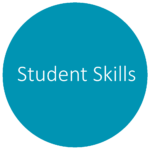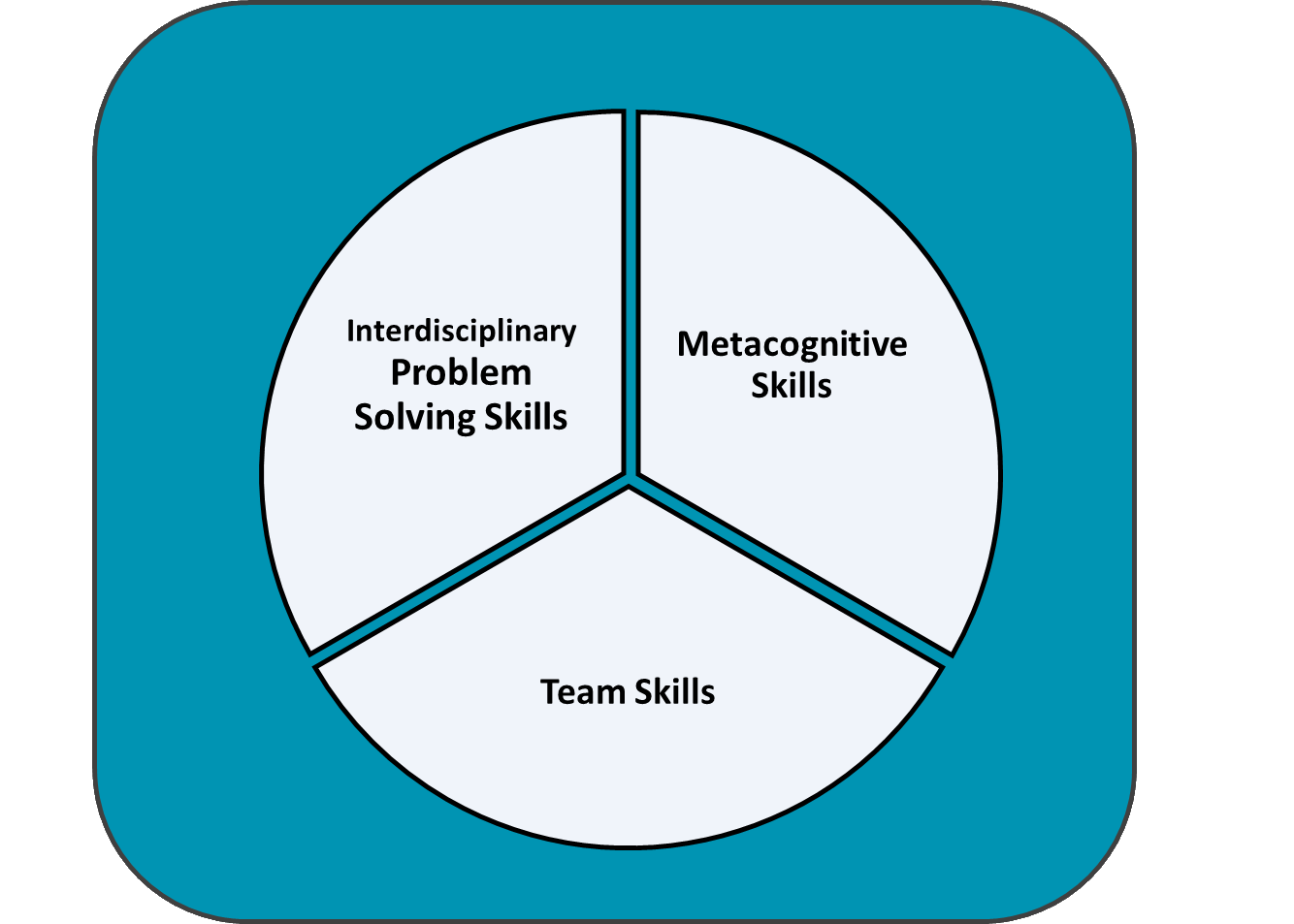
Home / Student Skills
STUDENT SKILLS
Below, we categorise a set of skills specifically relevant to interdisciplinarity. This can be useful for instructors to familiarise themselves with what the purposes of interdisciplinary learning might be, what some of the more unique requirements of a good interdisciplinary operator are, or for thinking more precisely about the kinds of skills they wish to develop in a course or programme of education.
These skills are not merely collected here, but are organized on a purely empirical basis. Skills are categorised according to metacognitive, interdisciplinary problem-solving and team-based skills; useful frameworks which capture the ambitious, more specific requirements as well as the collaborative dimensions of interdisciplinary work. (N.B. Resources are derived from various sources and the current list is by no means exhaustive.)

Metacognitive Skills
Metacognitive skills are strategies applied consciously or automatically during learning and allow the individual to organize and evaluate thought process related to learning and problem-solving (Flavell, 1976, 1979). They are often referred to as ‘thinking about thinking’. Metacognitive skills include planning, mental scripting, positive self-talk, self-questioning, self-monitoring and a range of other learning and study strategies. With respect to interdisciplinarity, metacognition can refer explicitly to the ability to conceptualise and communicate one’s own discipline (its assumptions, values, goals etc), and in turn, recognise its boundaries and limitations. Furthermore, it can refer to the ability to do this with other fields as well. The ability to do either of these things requires the ability to build more general level or abstract models of how different scientific fields operate, in order to draw connections or identify points of engagement.
Forming figures of speech that describe an object or action in a way that isn’t literally true but help explain an idea by making a comparison and drawing connections between similar situations, characters and objects figuratively (particularly in this case across disciplinary boundaries).
Tasks related to this skill:
Actively and skillfully conceptualising, applying, analysing, synthesising, and/or evaluating information gathered from, or generated by, observation, experience, reflection, reasoning, or communication, as a guide to belief and action. For interdisciplinarity we concentrate on the ability of students to critically examine their own disciplinary approaches (recognise limits and boundaries) and ask critical questions of other fields.
Tasks related to this skill:
Is the ability to communicate or solve a problem by integrating knowledge and experience from more than one field or subject. Being able to communicate disciplinary content involves taking a critical stand on disciplinary limitations,
solving complex problems across disciplines, communicating across disciplines, handling interdisciplinary collaboration and teamwork, as well as using integrative potentials to
create innovations (Brassler & Dettmers, 2017).
Tasks related to this skill:
Possessing a set of understandings that is more than broad knowledge of a field, rather, it is the sort of knowledge that is specific to the discipline or profession and defines a specialist in the area.
Tasks related to this skill:
The ability to converse expertly about a practical skill or expertise, but without being able to practice it, learned through linguistic socialisation with expert practitioners (Collins, 2004).
Tasks related to this skill:
Engaging in effective interdisciplinary work is afforded through certain attitudes and the ability to recognize one’s own disciplinary presuppositions and cognitive biases. In particular interdisciplinarity is afforded through epistemic humility, or an awareness that one’s own approach is limited – not always adequate or sufficient for a given problem – and subject to errors.
Tasks related to this skill:
This is a skill concerned with analysing how interconnected elements of a challenge produce outcomes and the consequences thereof.
Task related to this skill:
Forming figures of speech that describe an object or action in a way that isn’t literally true but help explain an idea by making a comparison and drawing connections between similar situations, characters and objects figuratively (particularly in this case across disciplinary boundaries).
Tasks related to this skill:
Actively and skillfully conceptualising, applying, analysing, synthesising, and/or evaluating information gathered from, or generated by, observation, experience, reflection, reasoning, or communication, as a guide to belief and action. For interdisciplinarity we concentrate on the ability of students to critically examine their own disciplinary approaches (recognise limits and boundaries) and ask critical questions of other fields).
Tasks related to this skill:
Is the ability to communicate or solve a problem by integrating knowledge and experience from more than one field or subject. Being able to communicate disciplinary content involves taking a critical stand on disciplinary limitations,
solving complex problems across disciplines, communicating across disciplines, handling interdisciplinary collaboration and teamwork, as well as using integrative potentials to
create innovations (Brassler & Dettmers, 2017).
Tasks related to this skill:
Possessing a set of understandings that is more than broad knowledge of a field, rather, it is the sort of knowledge that is specific to the discipline or profession and defines a specialist in the area.
Tasks related to this skill:
The ability to converse expertly about a practical skill or expertise, but without being able to practice it, learned through linguistic socialisation with expert practitioners (Collins, 2004).
Tasks related to this skill:
Engaging in effective interdisciplinary work is afforded through certain attitudes and the ability to recognize one’s own disciplinary presuppositions and cognitive biases. In particular interdisciplinarity is afforded through epistemic humility, or an awareness that one’s own approach is limited – not always adequate or sufficient for a given problem – and subject to errors.
Tasks related to this skill:
This is a skill concerned with analysing how interconnected elements of a challenge produce outcomes and the consequences thereof.
Task related to this skill:
Interdisciplinary Problem Solving Skills
Interdisciplinary problem-solving skills refers to the ability to explore content or solve a problem by integrating knowledge and experience which come from more than one field or subject. Although there is no absolute linear progression, the process involves defining a problem, determining all knowledge needs, developing a framework, specifying and gathering current and target knowledge and information. Finally, resolving interdisciplinary conflicts and integrating individual pieces based on relatedness and relevance (Parker, 2022).
Knowledge integration is the process of synthesising multiple knowledge models into a common model. Individuals integrate their knowledge by exploring, identifying, organising and synthesising ideas and information to assess experiences and solve problems.
Tasks related to this skill:
Methodological integration is the systematic process of combining more than one technique/method when analysing, collecting and integrating information into a complete model and is thus more effective than single modelling methods/techniques.
Tasks related to this skill:
The ability to weight the benefits of tackling a problem through an interdisciplinary or integrative approach versus a more multidisciplinary or even mono-disciplinary approach. Interdisciplinarity generally takes more effort and as higher risks.
Tasks related to this skill:
A problem-solving method that’s designed to align the entire team with one solution for a project by structuring the issue’s details in a digestible and collaborative way. It involves four steps: 1. Defining the problem; 2. Prioritising the problem 3. Understanding the problem; 4. Approving the solution.
Tasks related to this skill:
When responsibilities and workload related to one task are distributed among different individuals that perform own parts or portions of common work.
5 key steps to planning and allocating work:
1. Set Direction; 2. Planning and prioritising; 3. Allocating work; 4. Monitoring and supporting: 5. Manage improvement.
Tasks related to this skill:
Refers to the rational and strategic selection of a specific option, method or approach by being aware of the underlying models, theories or principles in a field of expertise.
Tasks related to this skill:
Refers to the reflection on the methodological choices, plans and actions taken to solve problems by relying on interdisciplinary knowledge. It involves evaluating the outcome, considering possible alternatives and making suggestions for further development or potential improvement.
Tasks related to this skill:
Knowledge integration is the process of synthesising multiple knowledge models into a common model. Individuals integrate their knowledge by exploring, identifying, organising and synthesising ideas and information to assess experiences and solve problems.
Tasks related to this skill:
Methodological integration is the systematic process of combining more than one technique/method when analysing, collecting and integrating information into a complete model and is thus more effective than single modelling methods/techniques.
Tasks related to this skill:
The ability to weight the benefits of tackling a problem through an interdisciplinary or integrative approach versus a more multidisciplinary or even mono-disciplinary approach. Interdisciplinarity generally takes more effort and as higher risks.
Tasks related to this skill:
A problem-solving method that’s designed to align the entire team with one solution for a project by structuring the issue’s details in a digestible and collaborative way. It involves four steps: 1. Defining the problem; 2. Prioritising the problem 3. Understanding the problem; 4. Approving the solution.
Tasks related to this skill:
When responsibilities and workload related to one task are distributed among different individuals that perform own parts or portions of common work.
5 key steps to planning and allocating work:
1. Set Direction; 2. Planning and prioritising; 3. Allocating work; 4. Monitoring and supporting: 5. Manage improvement.
Tasks related to this skill:
Refers to the rational and strategic selection of a specific option, method or approach by being aware of the underlying models, theories or principles in a field of expertise.
Tasks related to this skill:
Refers to the reflection on the methodological choices, plans and actions taken to solve problems by relying on interdisciplinary knowledge. It involves evaluating the outcome, considering possible alternatives and making suggestions for further development or potential improvement.
Tasks related to this skill:
Team Skills
These skills refer to a set of interrelated skills that enable individuals to work effectively with others during conversations, projects, meetings or other collaborations as members of an organized group. With respect to interdisciplinarity we focus on the particular ability to organize and work with others across interdisciplinary boundaries.
The ability to identify the individual and shared skills, abilities and knowledge, technology and processes that a teams should possess to work effectively and productively.
Tasks related to this skill:
Involves the description of the responsibilities and duties of team members and the division and delegation of tasks based on their skills and knowledge.
Tasks related to this skill:
Also known as core values, they reflect the team’s shared goals, strategy, rules and identity and help guide the organisation decision-making and actions. They are usually developed by a team’s leadership and then adopted by the other members of the group.
Tasks related to this skill:
Rules of operation and engagement help set expectations about how the group of students are going to go about getting their work accomplished. They include operating rules such as meeting formalities and attendance expectations, and work product rules like agreeing on how team decisions will be made and how work will be shared.
Tasks related to this skill:
Quality communication among team members increases awareness of their role, it develops trust, builds collaboration, boosts work ethics, and increases engagement. This skill involves attending to the team member’s needs, setting a clear agenda and goals, encouraging collaboration, establishing a feedback culture etc.
Tasks related to this skill:
Coordination minimises conflicts, frustration, delays, indifference and other group problems.
Effective coordination: 1. Maintain good communication; 2. Build a positive environment; 3. Acknowledge good work; 4. Demonstrating decisiveness; 5. Assign the tasks to the right people; 6. Set a good example; 7. Conflict management.
Tasks related to this skill:
Feedback gives people the insight to maximise their strengths and build upon their weaknesses. When each individual is self-aware and acts upon it, the team becomes more effective.
Establishing an effective feedback culture in a team:
1. Build psychological safety; 2. Ask for specific feedback; 3. Provide constructive feedback with examples instead of corrections; 4. Be open; 5. Encourage peer feedback; 6. Act upon the feedback.
Tasks related to this skill:
Trust is essential to an effective team, because it provides a sense of safety. When your team members feel safe with each other, they feel comfortable to open up, take appropriate risks, and expose vulnerabilities. Creating consensus in a team setting means finding a proposal acceptable enough that all team members can support it, with no member opposing it.
Tasks related to this skill:
Professional development helps students practise the skills they need to succeed in their future work place. Realistic or authentic project settings can facilitate this, along with deliberate training and facilitation.
Tasks related to this skill:
The ability to identify the individual and shared skills, abilities and knowledge, technology and processes that a teams should possess to work effectively and productively.
Tasks related to this skill:
Involves the description of the responsibilities and duties of team members and the division and delegation of tasks based on their skills and knowledge.
Tasks related to this skill:
Also known as core values, they reflect the team’s shared goals, strategy, rules and identity and help guide the organisation decision-making and actions. They are usually developed by a team’s leadership and then adopted by the other members of the group.
Tasks related to this skill:
Rules of operation and engagement help set expectations about how the group of students are going to go about getting their work accomplished. They include operating rules such as meeting formalities and attendance expectations, and work product rules like agreeing on how team decisions will be made and how work will be shared.
Tasks related to this skill:
Quality communication among team members increases awareness of their role, it develops trust, builds collaboration, boosts work ethics, and increases engagement. This skill involves attending to the team member’s needs, setting a clear agenda and goals, encouraging collaboration, establishing a feedback culture etc.
Tasks related to this skill:
Coordination minimises conflicts, frustration, delays, indifference and other group problems.
Effective coordination: Maintain good communication; Build a positive environment; Acknowledge good work; Demonstrating decisiveness; Assign the tasks to the right people; Set a good example; Conflict management.
Tasks related to this skill:
Feedback gives people the insight to maximise their strengths and build upon their weaknesses. When each individual is self-aware and acts upon it, the team becomes more effective.
Establishing an effective feedback culture in a team:
1. Build psychological safety; 2. Ask for specific feedback; 3. Provide constructive feedback with examples instead of corrections; 4. Be open; 5. Encourage peer feedback; 6. Act upon the feedback.
Tasks related to this skill:
Trust is essential to an effective team, because it provides a sense of safety. When your team members feel safe with each other, they feel comfortable to open up, take appropriate risks, and expose vulnerabilities. Creating consensus in a team setting means finding a proposal acceptable enough that all team members can support it, with no member opposing it.
Tasks related to this skill:
Professional development helps students practise the skills they need to succeed in their future work place. Realistic or authentic project settings can facilitate this, along with deliberate training and facilitation.
Tasks related to this skill:
Further Considerations...
For supplementary reading on other important aspects of team learning, see below:
- Team skills are not necessarily innate and need to be explicitly developed.
- Often, team mates can be reluctant to be overtly critical of their team mates’ contributions or behaviour.
- Communication issues and social loafing are the frequently cited problems in student teamwork.
- Interdisciplinary teams have added complexity due to distinctive epistemologies and jargon.
